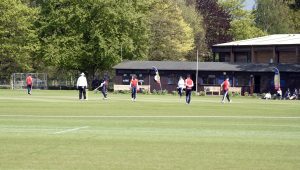Ownership and Management
Since 2020, Wisbech Grammar School has been owned by Wisbech International Holdings (WIH), a Hong Kong-listed company,. WIH is very proud to be associated with the distinguished history of Wisbech Grammar and the wider Wisbech community. From 2020 onwards, a careful programme of investment in resources, bursaries and scholarships has enabled the school to grow whilst continuing to provide excellent academic outcomes.
Wisbech Grammar School is licenced and regulated by the Department for Education and subject to exactly the same rigours of inspection as all other independent schools. Day-to-day, the school is managed by its Senior Leadership Team with the support of the Chair and Proprietor, Mr Jay Liu. We are fully committed to delivering an education that promotes Fundamental British Values of democracy, the rule of law, individual liberty, mutual respect and tolerance of those with different faiths and beliefs, and for those without faith. Wisbech Grammar School has no links to any political party, domestically or internationally.
The leadership and management within the school remains identical as to how it was before the ownership change in 2020, it is the governance where the differences lie. The governance structure of a proprietor owned School is different to a charitable school run by a board of governors/trustees and quite different to a state school/academy trust board.
Senior Team (ST): The ST is responsible for the day-to-day running and management of the School and reports to the Board regularly and as required. It is led by the three Executive Directors (Headmaster, Bursar, and International Director) with an extended team of Deputy Heads, Assistant Heads, Deputy and Assistant Bursars.
Board of Directors (Board): The Board of Directors has a membership of all Directors, both Executive and Non-Executive as listed on Companies House. The Board’s role is strategic, rather than operational in nature. It will oversee both the SMT and the Advisory Committee in their different functions. The role of meeting Chair will be shared by the Executive Directors on a rolling basis.
There will be three Executive Directors: Proprietor, Headmaster, and Bursar who together make up the Executive Team who lead the School on an operational basis.
There will be additional Non-Executive Directors to maintain independent oversight of the School on behalf of the Chairman. One of the Non-Executive Directors will be invited to become the Chair of the Advisory Committee, representing their views back to the Board.
Controlling party: The person with significant control (as majority shareholder of Wisbech International Holdings), known as ‘the Chairman’, will have a standing invitation to attend all Board meetings which will normally be held on a termly basis.
Advisory Committee: The Advisory Committee is made up of volunteers who will advise the Board on matters related to the running of the School, both collectively through the Advisory Committee and individually, but will have no decision-making authority.
At its outset, the Advisory Committee was made up of the Governors who were Trustees of the Charity (members of the former Governing Body) and who wanted to continue their voluntary association with the School. Over time the membership has changed, with the Chair of Wisbech Educational Foundation retaining a nominated seat, and others joining.
The Advisory Committee is designed as a layer of governance to assist the School in ensuring that it complies with regulatory requirements with a focus on actions being taken for the benefit of pupils (seeking to improve the quality and effectiveness of their education and their welfare, both academically and pastorally) and the wider community (including staff, parents, alumni and WEF)
The Board will be reviewing options to strengthen the Committee’s representation across the academic, pastoral and community remit.
Members of the Advisory Committee are invited to become both critical friends and a source of independent advice and guidance to the Board and the ST. Advisors may therefore be called upon in between meetings of the Advisory Committee.
The Advisory Committee is chaired by a Non-Executive Director, who will report on its actions and recommendations to the Board of Directors.
Independent specialist review: The Chairman will appoint independent specialists to audit specific areas of the School’s operational activities each term. These independent reviews will be ‘no notice’ in style with the Headmaster only being informed about them on the day they occur. Their purpose will be to provide independent insight into a specific area, from compliance and policy updates, safeguarding, health and safety, through to any aspect of the curriculum, teaching and learning styles, or readiness for inspection.
The Audit Reports will be presented at Board Meetings, passed on to the Advisory Committee to provide focal points for oversight and forwarded to the ST to feed into action plans.
These will be beyond the usual board reports prepared by the ST and in addition to findings and visits from the Advisory Committee and NEDs.
Non-Executive Director’s Comment: As a collection of ‘checks and balances’, this is far superior to any of the four schools I have ever worked in over a 25 year career in education. They set out a range of ways for staff to be held to account through independent scrutiny, and together will ensure greater oversight than we have ever had before. I am fully supportive of this model as it will enable us to continue to evolve our structures, processes and procedures to ensure we maintain our focus on delivering an education that inspires.

